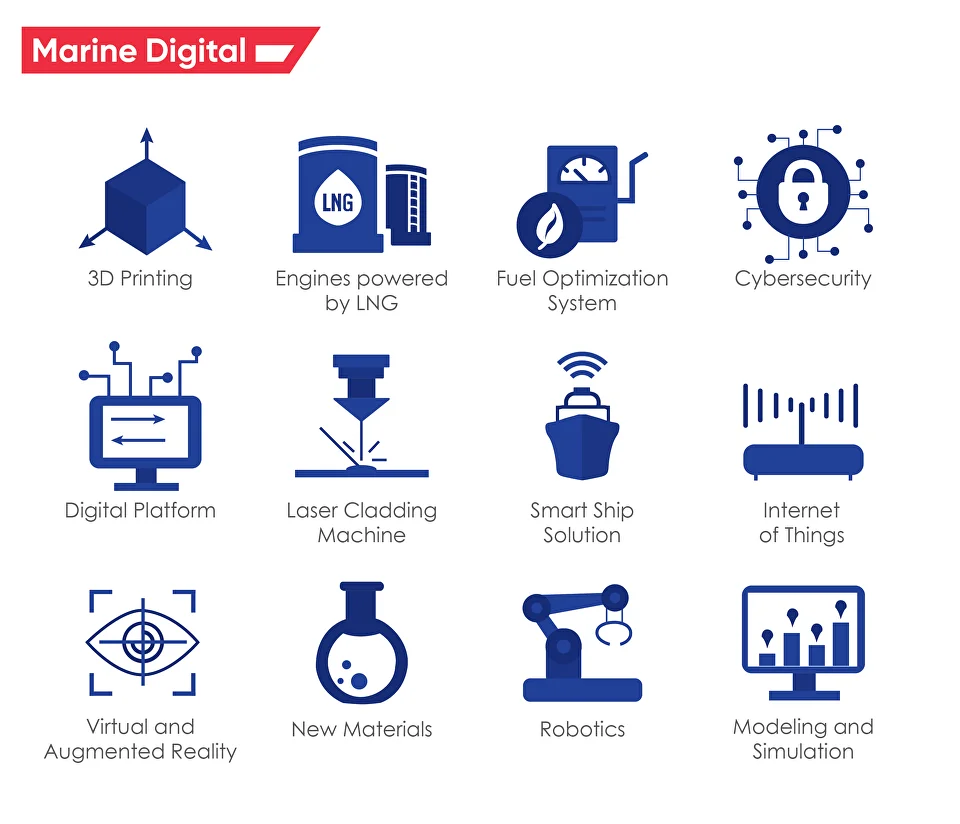Any industry in the world cannot develop steadily without the use of modern technologies. Shipbuilding is also actively applying modern technologies, and is now developing at an increased speed. While the automotive and aviation industries have long gone ahead in automation, shipbuilding is in its infancy in comparison. But the variety of modern technologies will soon allow it to catch up with the two previously designated industries and even get ahead of them in the field of IT application.
Some of today’s technologies could be revolutionary for the shipbuilding industry. In this article, we would like to outline only a small part of them, the benefits from the use of which, we believe, will be felt at the turn of the next 5-7 years.
3D printing
The Economist argues that industrial-scale use of this technology will be “the fourth industrial revolution.” This technology allows you to create real objects from virtual 3D models. Special equipment recreates a 3D object by printing sections into which the virtual object is “cut”. Today this technology is actively used for the production of scientific equipment, the creation of small structures, the creation of prostheses and models for various purposes.
The shipbuilding industry can use this technology to create ships of complex geometry by printing various elements of the ship’s skin on a 3D printer. Moreover, 3D printers allow in a short time to recreate a part that is out of order and requires quick replacement.

Robotics
It is one of those technologies of the third industrial revolution that has undergone changes due to the development of digital technologies. Modern realities force us to create robots more flexible, able to perform various tasks, and not monotonous repetition, to which everyone is accustomed (conveyor belt). Moreover, the use of modern sensors allows integration between the robot and the operator, which leads to an increase in the possible tasks performed by the robot.
Although this technology is mainly used to perform very simple repetitive actions, such as on a production line, leading shipyards have introduced this technology into their production systems, dramatically increasing the scale and speed of production. In addition, new advances have been made in developing robots for specific shipbuilding tasks such as inspecting pipes or cleaning hulls.
Virtual and Augmented Reality (VR/AR)
On the one hand, virtual reality implies the complete immersion of a person in the virtual world using a special device connected to simulation. In this virtual world, the user can interact with virtual elements in order to significantly train and improve their knowledge. It also applies to testing and validation of complex products.
On the other hand, augmented reality connects the real world with the virtual one with the help of a device, adding data from the virtual system (or digital twin) exactly where it is needed. This technology is useful not only in manufacturing processes but also in maintenance tasks. Augmented reality also offers applications for quality control, product and tool location, warehouse management, and support for the visualization of hidden areas, among others.
In the shipbuilding industry, both technologies are already being used in small training and part positioning applications.
Engines powered by LNG
The popularity of liquefied natural gas (LNG) as an alternative fuel for ships these days is evident due to its environmental friendliness. Therefore, the market for LNG-powered marine engines is in its infancy and prospects are also high.
LNG engines reduce CO2 emissions by 20-25% compared to diesel engines, NOX emissions are reduced by almost 92%, and SOX and particulate matter emissions are almost completely eliminated. Moreover, new generation marine engines are imperatively required to comply with IMO restrictions. These engines are one of the ways to optimize fuel consumption along with FOS (Fuel Optimization System)
Major marine engine designers – Mitsubishi, Wartsila, Rolls-Royce and MAN Diesel & Turbo – are engaged in the technological development of CNG engines.
In addition to being an environmentally friendly fuel, LNG is also cheaper than diesel fuel, which helps the vessel save significant amounts of money over time.
Laser Cladding Machine
One of their latest developments is a laser cladding machine used to clad steel or stainless steel piston rods for hydraulic cylinders. Laser technology provides greater precision but is more harmful to the environment.
With the ability to combine alloys, it is helping to investigate different types of liners that could lead the marine industry away from the current preferred ceramic coating for ships.
As this technology shortens the supply chain, provides a higher quality lining process and is more resistant to damage during transportation, it is a reliable solution that will provide benefits in the distant future.
Smart Ship Solution
The shipping industry is vulnerable to cyber attacks, as proven by a number of large companies and their vessels. It is important to understand that ships are also part of cyberspace, which means that security measures need to be taken not only ashore, but also integrated into the ship’s onboard architecture.
Smart ship solution uses real-time data from various sensors (on hull, equipment, boats, etc.), as well as managers on land to improve the efficiency of the vessel. The engineers of this system are aware that this transfer of data between the ship and the shore carries a cybersecurity risk.
But at the same time, the correct use of sensors and their compliance with cybersecurity requirements will make the Smart Ship solution a safe choice for all shipping professionals concerned with cybersecurity. This means that the technology could be the beginning of a new generation of ships.